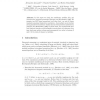Free Online Productivity Tools
i2Speak
i2Symbol
i2OCR
iTex2Img
iWeb2Print
iWeb2Shot
i2Type
iPdf2Split
iPdf2Merge
i2Bopomofo
i2Arabic
i2Style
i2Image
i2PDF
iLatex2Rtf
Sci2ools
105
click to vote
ECP
1999
Springer
1999
Springer
SAT-Based Procedures for Temporal Reasoning
In this paper we study the consistency problem for a set of disjunctive temporal constraints [Stergiou and Koubarakis, 1998]. We propose two SAT-based procedures, and show that—on sets of binary randomly generated disjunctive constraints—they perform up to 2 orders of magnitude less consistency checks than the best procedure presented in [Stergiou and Koubarakis, 1998]. On these tests, our experimental analysis confirms Stergiou and Koubarakis’s result about the existence of an easy-hard-easy pattern whose peak corresponds to a value in between 6 and 7 of the ratio of clauses to variables.
Consistency Problem | Disjunctive Constraints—they | Disjunctive Temporal Constraints | ECP 1999 | Robotics |
Related Content
| Added | 04 Aug 2010 |
| Updated | 04 Aug 2010 |
| Type | Conference |
| Year | 1999 |
| Where | ECP |
| Authors | Alessandro Armando, Claudio Castellini, Enrico Giunchiglia |
Comments (0)

